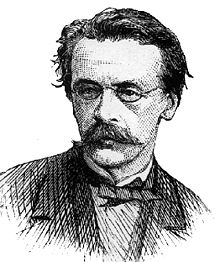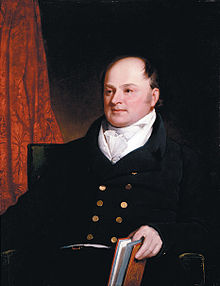
Advocates of Manifest Destiny believed that expansion was not only wise but that it was readily apparent (manifest) and inexorable (destiny).
The concept of American expansion is much older, but John O’Sullivan coined the exact term "Manifest Destiny" in the July/August 1845 issue of the United States Magazine and Democratic Review in an article titled “Annexation”.[1] It was primarily used by Democrats to support the expansion plans of the Polk Administration, but the idea of expansion was opposed by Whigs like Henry Clay and Abraham Lincoln who wanted to deepen the economy rather than broaden its expanse. It fell out of favor by 1860.[2]
The belief in an American mission to promote and defend democracy throughout the world, as expounded by Abraham Lincoln and Woodrow Wilson, continues to have an influence on American political ideology.[3]
Contents[show] |
[edit] Context and interpretations
Manifest Destiny was always a general notion rather than a specific policy. The term combined a belief in expansionism with other popular ideas of the era, including American exceptionalism, Romantic nationalism, and a belief in the natural superiority of the English-speaking peoples (at the time often called the "Anglo-Saxon race"). While many writers focus primarily upon American expansionism when discussing Manifest Destiny, others see in the term a broader expression of a belief in America's "mission" in the world, which has meant different things to different people over the years. This variety of possible meanings was summed up by Ernest Lee Tuveson, who wrote:A vast complex of ideas, policies, and actions is comprehended under the phrase 'Manifest Destiny'. They are not, as we should expect, all compatible, nor do they come from any one source.[4]

Six years later O'Sullivan wrote another essay which first used the phrase Manifest Destiny. In 1845, he published a piece entitled Annexation in the Democratic Review,[6] in which he urged the United States to annex the Republic of Texas, not only because Texas desired this, but because it was "our manifest destiny to overspread the continent allotted by Providence for the free development of our yearly multiplying millions".[7] Amid much controversy, Texas was annexed shortly thereafter, but O'Sullivan's first usage of the phrase "Manifest Destiny" attracted little attention.[8]
O'Sullivan's second use of the phrase became extremely influential. On December 27, 1845 in his newspaper the New York Morning News, O'Sullivan addressed the ongoing boundary dispute with the United Kingdom in the Oregon Country. O'Sullivan argued that the United States had the right to claim "the whole of Oregon":
And that claim is by the right of our manifest destiny to overspread and to possess the whole of the continent which Providence has given us for the development of the great experiment of liberty and federated self-government entrusted to us.[9]That is, O'Sullivan believed that Providence had given the United States a mission to spread republican democracy ("the great experiment of liberty") throughout North America. Because Britain would not use Oregon for the purposes of spreading democracy, thought O'Sullivan, British claims to the territory should be overruled. O'Sullivan believed that Manifest Destiny was a moral ideal (a "higher law") that superseded other considerations.[10]
O'Sullivan's original conception of Manifest Destiny was not a call for territorial expansion by force. He believed that the expansion of the United States would happen without the direction of the U.S. government or the involvement of the military. After "Anglo-Saxons" emigrated to new regions, they would set up new democratic governments, and then seek admission to the United States, as Texas had done. In 1845, O'Sullivan predicted that California would follow this pattern next, and that Canada would eventually request annexation as well. He disapproved of the outbreak of the Mexican-American War in 1846, although he came to believe that the outcome would be beneficial to both countries.[11]
Ironically, O'Sullivan's term became popular only after it was criticized by Whig opponents of the Polk administration. On January 3, 1846, Representative Robert Winthrop ridiculed the concept in Congress, saying "I suppose the right of a manifest destiny to spread will not be admitted to exist in any nation except the universal Yankee nation." Winthrop was the first in a long line of critics who suggested that advocates of Manifest Destiny were citing "Divine Providence" for justification of actions that were motivated by chauvinism and self-interest. Despite this criticism, expansionists embraced the phrase, which caught on so quickly that its origin was soon forgotten. O'Sullivan died in obscurity in 1895, just as his phrase was being revived. In 1927, a historian determined that the phrase had originated with him.[12]
[edit] Themes and influences
Historian William E. Weeks has noted that three key themes were usually touched upon by advocates of Manifest Destiny:- the virtue of the American people and their institutions;
- the mission to spread these institutions, thereby redeeming and remaking the world in the image of the U.S.; and
- the destiny under God to accomplish this work.[13]
We have it in our power to begin the world over again. A situation, similar to the present, hath not happened since the days of Noah until now. The birthday of a new world is at hand...Many Americans agreed with Paine, and came to believe that the United States had embarked upon a special experiment in freedom and democracy—and a rejection of Old World monarchy in favor of republicanism—an innovation of world historical importance. President Abraham Lincoln's description, in his December 1, 1862 message to Congress, of the United States as "the last, best hope of Earth" is a well-known expression of this idea. Lincoln's Gettysburg Address, in which he interpreted the Civil War as a struggle to determine if any nation with democratic ideals could survive, has been called by historian Robert Johannsen "the most enduring statement of America's Manifest Destiny and mission".[14]
Lincoln opposed Southern sectionalism, anti-immigrant nativism, and the imperialism of Manifest Destiny as both unjust and unreasonable. He believed each of these disordered forms of love threatened the inseparable moral and fraternal bonds of liberty and Union that he sought to perpetuate through a patriotic love of country guided by wisdom and critical self-awareness. Lincoln's "Eulogy to Henry Clay", June 6, 1852 provides the most cogent expression of his reflective patriotism.[15]
Not all Americans who believed that the United States was a divinely favored nation thought that it ought to expand. Whigs especially argued that the "mission" of the United States was only to serve as virtuous example to the rest of the world. If the United States was successful as a shining "city on a hill," people in other countries would seek to establish their own democratic republics. Thomas Jefferson initially did not believe it necessary that the United States should grow in size, since he predicted that other, similar republics would be founded in North America, forming what he called an "empire for liberty." However, with the Louisiana Purchase in 1803, which doubled the size of the United States, Jefferson set the stage for the continental expansion of the United States. Many began to see this as the beginning of a new "mission"—what Andrew Jackson in 1843 famously described as "extending the area of freedom." As more territory was added to the United States in the following decades, whether or not "extending the area of freedom" also meant extending the institution of slavery became a central issue in a growing divide over the interpretation of America's mission.
[edit] Era of continental expansion

[edit] Continentalism
The nineteenth century belief that the United States would eventually encompass all of North America is known as "continentalism".[17] An early proponent of this idea was John Quincy Adams, a leading figure in U.S. expansion between the Louisiana Purchase in 1803 and the Polk administration in the 1840s. In 1811, Adams wrote to his father:The whole continent of North America appears to be destined by Divine Providence to be peopled by one nation, speaking one language, professing one general system of religious and political principles, and accustomed to one general tenor of social usages and customs. For the common happiness of them all, for their peace and prosperity, I believe it is indispensable that they should be associated in one federal Union.[18]Adams did much to further this idea. He orchestrated the Treaty of 1818, which established the United States-Canada border as far west as the Rocky Mountains, and provided for the joint occupation of the region known in American history as the Oregon Country and in British and Canadian history as the New Caledonia and Columbia Districts. He negotiated the Transcontinental Treaty in 1819, purchasing Florida from Spain and extending the U.S. border with Spanish Mexico all the way to the Pacific Ocean. And he formulated the Monroe Doctrine of 1823, which warned Europe that the Western Hemisphere was no longer open for European colonization.
The Monroe Doctrine and Manifest Destiny were closely related ideas: historian Walter McDougall calls Manifest Destiny a corollary of the Monroe Doctrine, because while the Monroe Doctrine did not specify expansion, expansion was necessary in order to enforce the Doctrine. Concerns in the United States that European powers (especially Great Britain) were seeking to acquire colonies or greater influence in North America led to calls for expansion in order to prevent this. In his influential 1935 study of Manifest Destiny, Albert Weinberg wrote that "the expansionism of the [1830s] arose as a defensive effort to forestall the encroachment of Europe in North America."[19]
